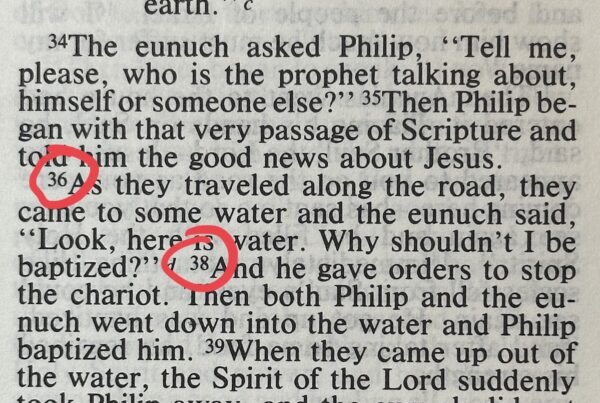Eddie asks, What does it mean that God MADE him who had no sin to sin for us? The word ‘made’ sounds as if God made Jesus. But isn’t Jesus supposedly eternal and part of the Trinity? Is the word “made” different in the Greek or Hebrew, because just saying God sent Jesus without explaining why it says “made” is hard for me.
RESPONSE FROM RICH KNOPP:
Eddie, thanks so much for your question. Your question pertains to a passage in 2 Corinthians 5:21. Let’s look at a few English translations just for comparison sake:
2 Cor. 5:21 He made Him who knew no sin to be sin on our behalf, so that we might become the righteousness of God in Him [New American Standard Version].
2 Cor. 5:21 God made him who had no sin to be sin for us, so that in him we might become the righteousness of God [New International Version].
2 Cor. 5:21 For our sake he made him to be sin who knew no sin, so that in him we might become the righteousness of God [English Standard Version].
As you can see, all three versions use the word “made.” Taken all by itself, the word “made” might seem to mean that God made Jesus, as though God created Jesus. If we take it in this sense, then it would indeed contradict the idea that Jesus is eternal and not created. (The Greek word translated as “made” here is a very common Greek word [poieō], which means “make” or “do.”)
However, the passage clearly does not mean that God created Jesus. It means that God made Jesus sin. This does not mean that Jesus himself sinned in any specific way, but that God imputed to Jesus the weight of all sin. Other passages help clarify this point. John the Baptist identified Jesus as the “lamb of God who takes away the sin of the world” (John 1:29). The apostle Paul says that “Christ redeemed us from the curse of the Law, having become a curse for us …” (Galatians 3:13). And the apostle Peter says that Christ himself “bore our sins in His body on the cross” (1 Peter 2:21). In other words, Christ made it possible for us to be reconciled to God, because God transferred sin to His crucified Son. As a result, it is possible for us “become the righteousness of God in Him” (2 Cor. 5:21).
It’s a great image that should bring amazing encouragement to us! Christ becomes sin for us so that we might become righteous before God. The righteousness of Christ is imputed to us. This is especially notable because Jesus Christ, “Who, being in very nature God, did not consider equality with God something to be used to his own advantage; rather he made himself nothing by taking the very nature of a servant, being made in human likeness, And being found in appearance as a man, he humbled himself by becoming obedient to death—even death on a cross” (Philippians 2:6-8 NIV).
Hopefully, these considerations will help you see that 2 Corinthians 5:21 does not dispute the deity of Christ. It demonstrates what God, through the eternal Christ, was willing to do for us.
–Dr. Rich Knopp, Program Director, Room For Doubt; Professor of Philosophy & Christian Apologetics, Lincoln Christian University.





